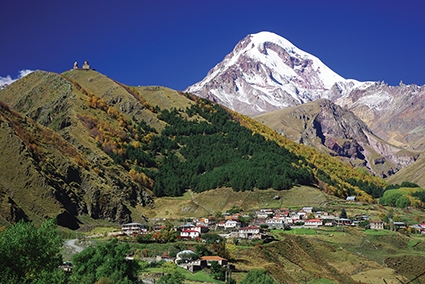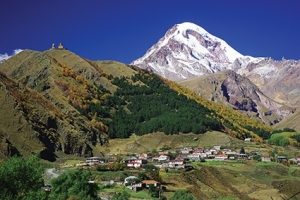Spotlight on Food Security Issues in Georgian Mountain Villages
On March 25, 2016, Oxfam Georgia and the Rural and Agricultural Policy and Development Institute (RAPDI) presented the research findings of the first nationwide study on food security and nutrition in the Greater and Lower Caucasus Mountains in Georgia. The research shows that despite the mountainous regions of Georgia demanding and having all opportunities for development, there are alarming problems regarding food security.
“The objective of the study was to explore the current situation regarding food security and nutrition in the high mountainous regions of Georgia and to evaluate climate change risks regarding food production and accessibility to food,” said representatives of Oxfam Georgia. “The key component of the study was also to identify the gender dynamics in food production and consumption practices.”
The study covered three regions of Georgia bordering the Russian Federation, Turkey, Armenia and Azerbaijan. Researchers focused particularly on villages located to the west and east of the Greater Caucasus range and in the Lower Caucasus Mountains.
A number of important issues were spotlighted, including food security conditions, access to products, and availability and quality. Results show the level of food security is much lower than in other regions of Georgia. The residents of mountain regions are restricted to engaging only in cattle-breeding and potato-growing. According to statistics, 94 percent of locals grow potatoes while other agricultural crops are available to less than 50 percent of the population.
Based on this, it appears that the majority of basic consumer products, including vegetables, eggs, breads, cereals, fish and poultry need to be imported from other regions of the country, despite there being an obvious issue in the mountain regions regarding logistics, transport and infrastructure. There are consistent risks of landslides, avalanches, floods and other natural disasters in the mountains and, as such, the price of products imported from other regions of Georgia is often very high.
About half the studied population admitted that they have only enough income for food and transport, while for 13 percent it was not enough even for food. In addition, 41 percent of locals said that they prefer to buy low quality products at a more affordable price.
The researchers argue that the mountain regions of Georgia should be given special attention, particularly in the context of the increasing interest of tourists to travel to such areas and the desire of the energy sector to develop infrastructure there. In particular, the researchers proposed the establishment of a special program for mountain regions to eliminate the problem of food and access to products with the aim of paving the way for development of such regions.
The studies were conducted based on an analysis of existing data. In addition, interviews with local residents were carried out through various formats- surveys, questionnaires, face-to-face interviews and focus groups.
Eka Karsaulidze












